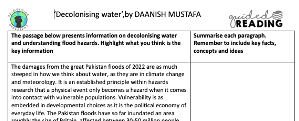A guided reading version of this article for use in classrooms can be found here.

The damages from the great Pakistan floods of 2022 are as much steeped in how we think about water as they are in climate change and meteorology. It is an established principle within hazards research that a physical event only becomes a hazard when it comes into contact with vulnerable populations. Vulnerability is as embedded in developmental choices as it is the political economy of everyday life. The Pakistan floods have so far inundated an area roughly the size of Britain, affected between 30-50 million people, and led to the deaths of more than 1200 people. The damages suffered so far are not solely a function of the physical events of extraordinary monsoons. They are equally a function of the infrastructural and engineering choices driven by certain developmental imaginaries, which are certainly not indigenous to Pakistan. I argue that the need to decolonize water in Pakistani policy and public imagination is urgent.
What does decolonisation mean? To my mind, it means that there are many ways of knowing the world in addition to the dominant Western way of knowing. Taking account of those different ways of knowing, doing, and imagining the past and future will enrich human life and emancipate, instead of sticking to the singular way of knowing. It does not replace science, it enriches it by bringing in the diversity of human experience.
So, what does decolonising water mean? Or what does it mean in the context of the Pakistan floods of 2022? In colonial India, of which Pakistan was a part, 150 years ago the thinking about water was locked into a modernist view of water as a ‘resource’ to the exclusion of its multiple values within the local cultures. The modernist view treated water as simply a ‘resource’ for irrigation, water supply and sanitation. The aesthetic, cultural, spiritual, and ecological values that the local societies ascribed to water were simply occluded by this view. Under modernity rivers were a giant plumbing system carrying cubic meters/feet of water, and were expected to stay within the imposed iron limits of average flows.
Experientially for the local societies in Pakistan/India, average flows were meaningless as were cubic meter numbers. To them rivers were living entities with their moods and regimes with no two days the same. People lived and interacted with rivers like they lived and interacted with their families. This vernacular knowledge, however, was underpinned as much by empirical observations and understandings of hydrology, geomorphology and meteorology as its modern counterparts, except that it articulated that knowledge in terms of a living, sentient nature instead of an inanimate physical entity subject to human constructs and principles imposed upon it.
Floods are part of the natural rhythms of a river, as are extreme rainfall events of the atmospheric system. They don’t care about staying within the statistically derived limits of average flows and precipitation that modern humans have come to expect of them. Decolonizing water will mean decentring the modern expectations of average volumetric flows for rivers and centimetres of rainfall, and recentring vernacular experience of uncertainty, dynamism and hazardousness in thinking, policy and practice about water.
No scientist worth their salt will ever ascribe any specific event to climate change. Climate models will tell many different stories about what the future will look like. But one thing every climate scientist will agree upon. Climate change is happening and under it past expectations of averages and normality are simply not going to hold. In such a scenario, decolonizing water becomes doubly urgent to bring back the habits of mind and practice that have helped humans become the most successful species on the planet in the past three hundred thousand years of their contemporary existence. Science and the decolonizing water agenda converge under climate change.
Since colonial times, the expectation that rivers will have average annual flows, or rains will be within normal monthly parameters has driven very expensive and unsustainable engineering practices and infrastructural development in the Indus Basin. As mountain streams flooded they swept away the hotels and residential buildings that were built up in the mountainous tourist destinations of Pakistan. Down south in Balochistan and Sindh, intensive rains and resultant run off swept away more than 30 dams and inundated thousands of square kilometres of land. As the water flowed towards its natural drainage in Indus River in Sindh, its flow was interrupted by artificial embankments in the form of levees along the river, and road, railway and canal berms in the low lying flat relief of the Indus plains. In early September 2022 millions are stranded on elevated roads and canal banks in Sindh and Balochistan, on the very bunds that are keeping the water impounded that is drowning their homes and land.
Decolonised water offers an effective critique of modern water. But does it offer any promise of relief and future protection to the millions in Pakistan? That will be subject of my next article in this two part series.
This is the first of two articles by Daanish Mustafa, Professor in Critical Geography at Kings College London, about water politics and flooding in the context of Pakistan.

